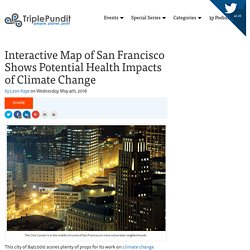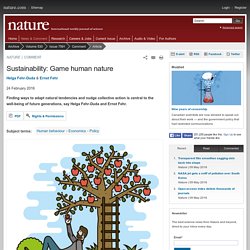

Chapter7 Human Health Eng. UN1 2%20Prats. Social dimensions of climate change. Interactive Map Shows Potential Health Impacts of Climate Change. This city of 840,000 scores plenty of props for its work on climate change research.

But the fact that it is surrounded by water on three sides means that San Francisco could have a rough go later this century unless more is done worldwide to avert climate change. At least, that is the assessment of the city’s Department of Public Health, which last week released an interactive map displaying the potential effects that climate change could have on its residents. Unlike many climate change assessments that focus on the risk of damage to property and infrastructure, these maps focus on how floods and extreme weather could eventually affect citizens’ health and well being.
The Bay Area is a fragile environment. The verdant and lush farms and orchards of Santa Clara have been transformed into office parks and housing tracts for the workers in today’s Silicon Valley. And if current trends continue, the area’s terrain and climate could be unrecognizable by the end of this century. Combatting Climate Change: Involving Indigenous Communities. Synopsis Climate change combat is often in the hands of policy-makers, researchers and governments.

However it is the marginalised and indigenous communities that feel the full force of climate change effects. To be effective the campaign needs to include the wisdom and traditional practices of these communities to better protect those who need it the most. Commentary IN CELEBRATION of Earth Day, delegates to the UN Framework Convention on Climate Change (UNFCCC) signed the agreement adopted at the 2015 COP21 meeting in Paris to ratify commitments to reduce carbon emissions and the effects of climate change. Intergenerational fairness inquiry - UK Parliament. More hospital gardens needed to help patients, Carleton researchers say - Ottawa. Can a green thumb help heal the body and the mind?

A group of Carleton University students hope their research into the physical, mental and social benefits of therapeutic gardens can help them take root at hospitals and other health-care institutions. Five Carleton Master's students looked at three hospitals that have therapeutic gardens, including Glengarry Memorial Hospital in Alexandria, Ont., as well as the existing literature on their benefits, in hopes of providing ways to best measure their effect. "You would think it must be hard to measure someone's level of stress but we found that there's some creative ways to do so ... [like] you can measure patient's blood pressure level before or after being in the garden," said Marie-Claire Flores-Pajot, one of the students who worked on the study.
Japan’s elderly turn to life of crime to ease cost of living. The mathematics of recidivism are gloomily compelling for the would-be convict.

Even with a frugal diet and dirt-cheap accommodation, a single Japanese retiree with minimal savings has living costs more than 25 per cent higher than the meagre basic state pension of Y780,000 ($6,900) a year, according to a study on the economics of elderly crime by Michael Newman of Tokyo-based research house Custom Products Research. Even the theft of a Y200 sandwich can earn a two-year prison sentence, say academics, at an Y8.4m cost to the state. More from The Financial Times : Donald Trump embodies how great republics meet their endUS high-street banks face $5bn hit from Fed's more dovish stanceHuge crowds turn out to mark centenary of Ireland's Easter Rising The geriatric crime wave is accelerating, and analysts note that the Japanese prison system — newly expanded and at about 70 per cent occupancy — is being prepared for decades of increases.
Sustainability: Game human nature. Illustration by Greygouar Hundreds of studies in behavioural economics and other social sciences, conducted over the past few decades, have established that people often make choices that take into account the well-being of others.

This contradicts an assumption held over centuries that people exclusively pursue their own material well-being. It also offers hope for the prospect of developing public goods (see ‘Glossary: behavioural economics’) that will benefit future generations. Glossary: Behavioural economics However, another body of evidence, gathered over the past two or three decades, indicates that people display an array of other tendencies, such as giving excessive weight to current benefits over future ones.
New Conservation Strategy Benefits People and Nature. Costa Rica’s rich biological diversity of birds and other wildlife drives a thriving tourism industry and provides economically vital services to farmers, such as pest-suppression, crop pollination and seed-dispersal.

Perspectives on why and how that diversity should be conserved can be equally varied, and sometimes conflict. A new study from Stanford researchers may lead to greater alignment of conservation efforts in Costa Rica and around the world. Unsurprisingly, approaches to conservation depend on objectives. For example, creating large, isolated nature preserves may protect endangered species, but would not likely benefit farmers with enhanced crop pollination. Similarly, the steps taken to preserve pollinators may not help save rare species that attract tourist birdwatchers, according to co-author Paul Ehrlich, the Bing Professor of Population Studies in biology and a senior fellow at the Stanford Woods Institute.